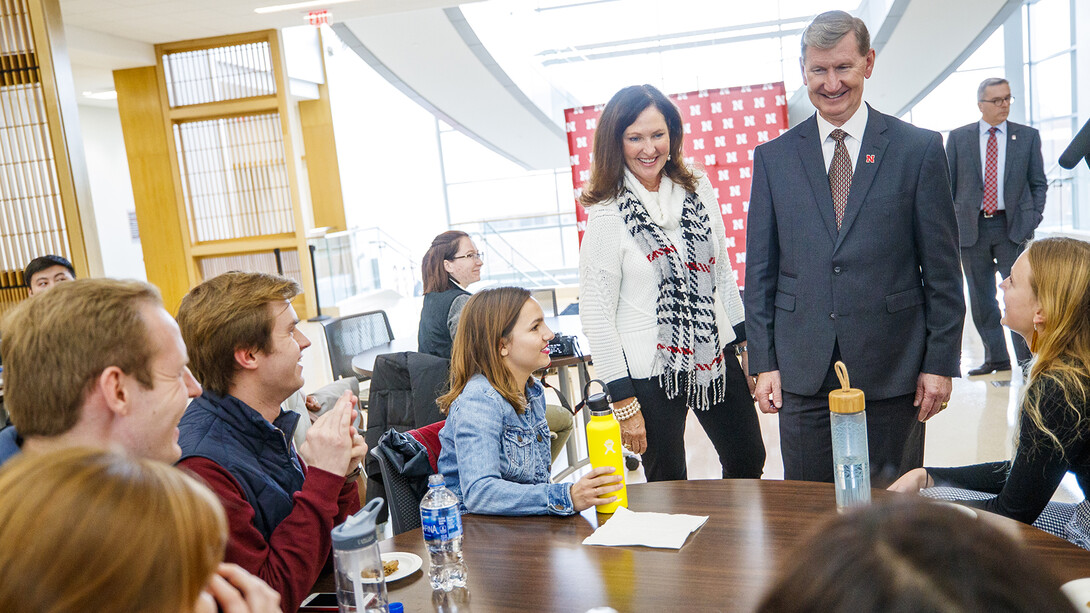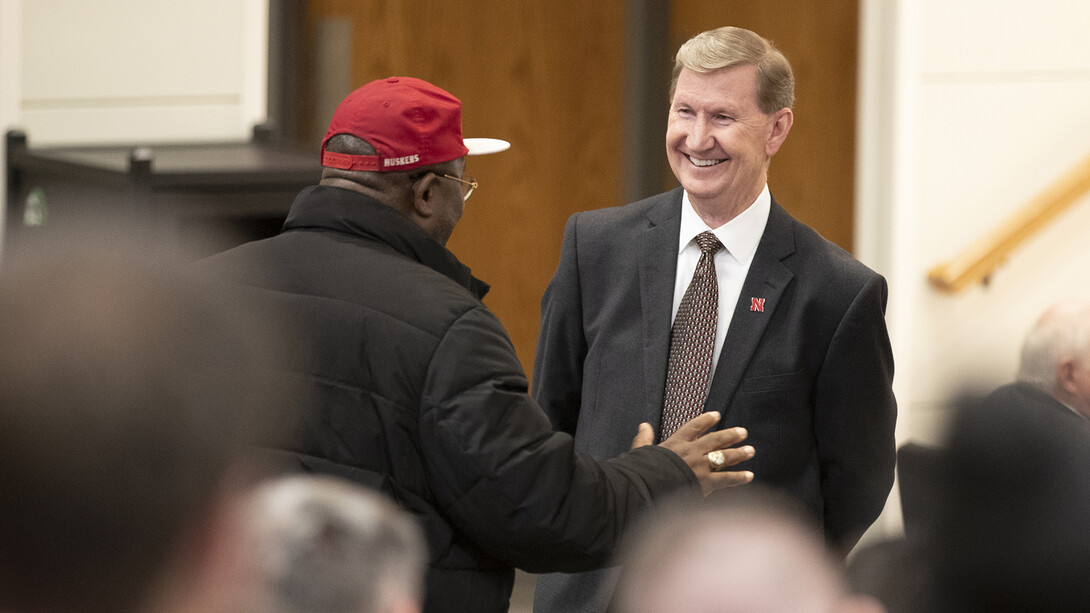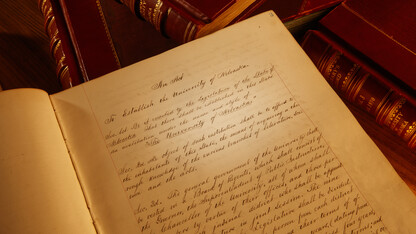
Responding to a question about leadership style and the transition from the perceived rigidity of a service academy to the free-flowing nature of a liberal arts institution, Walter “Ted” Carter Jr. took more than 150 faculty and staff on a bombing run that helped define his career and beliefs.
“Let me tell you about my own personal experience and the time I actually disobeyed a direct order,” Carter said. “It was a decision that I thought was going to earn a court martial or a pat on the back.”
Carter, the priority candidate to serve as the University of Nebraska system’s eighth president, took part in three campus open forums on Nov. 5. The events — along with a Nov. 6 open forum at Nebraska Innovation Campus — are part of Carter’s 30-day public vetting period, which includes public presentations across the NU system and in Nebraska communities.

During his Nov. 5 morning forum in the Nebraska Union’s Swanson Auditorium, Carter spoke directly to faculty and staff. He discussed his history — from growing up in rural Rhode Island to retiring as leader of the U.S. Naval Academy — and answered questions about academic freedom, LGBTQA+ issues, campus governance, sustainability, research priorities, academic excellence and leadership style.
“It was April 11, 1999 and I was leading a 30 plane strike with jets loaded with bombs to take out a bridge in the southeast corner of Kosovo,” Carter, whose Navy call sign was Slapshot, said. “It was an important operation — approved by a four-star general — because the Serbians were using the bridge to conduct genocide operations.”
Carter said he raised concerns about the mission and it’s chance for casualties on what was Easter Sunday for members of the Eastern Orthodox religion — which made up about 20 percent of the population in the region. Despite the misgivings, the order stood and the planes launched for a daytime mission.
Carter, as leader of the flight, was responsible for signaling the bomb drop. Flying at about six miles a minute, Carter noticed the structure looked clear of activity and set his bombsight on the bridge footings.
“We were about 10 miles away and planning to drop bombs at six miles out,” Carter said. “I could see the shape of the bridge on the viewscreen and it looked like there was no movement. I was relieved because we would be able to drop and no one would get hurt.”
Near the seven-mile mark, the video screen showed that the a lack of bridge activity was actually the result of bumper-to-bumper traffic.
“It was a complete traffic jam,” Carter said. “We were in radio silence, but I transmitted the code word to abort. Luckily, not one airplane dropped a bomb and we flew over the bridge.
“When we landed, a whole bunch of people waited for me and wanted to know why we did not drop.”
Military officials watched the video and, in the end, agreed with Carter’s field decision to abort the mission. His choice didn’t result in a pat on the back or a court martial, but it has been featured in military ethics journals. And, Carter used it to showcase his beliefs on leadership and how decisions — in military life or academics — are strongest when made through discourse.
“It’s not going to be my way or the highway,” Carter said. “There needs to be conversation and dissenting opinion. We’re not going to get the 23-0 vote every time. To me, leadership is about making informed decisions that better the institution and help fulfill the mission of the university.”

More than 250 students, faculty and staff attended the three forums on Nov. 5. Carter’s open forum schedule continues with a 4 to 5:30 p.m. Nov. 6 public presentation at Nebraska Innovation Campus.
Students, faculty, staff and the public are encouraged to learn more about Carter and provide feedback on his selection as priority candidate for the NU presidency.
Other topics and Carter’s response to them during his Nov. 5 open forums include:
Academic freedom
“I believe in the power of academic freedom. The whole reason we have it is so faculty can write or teach in the classroom while also being able to seek out truth for the common good. It empowers you to not only seek that truth, but to be able to speak to it and do so without fear of repercussions.”
LGBTQA+
“Gender integration was its own challenge (in the Navy), and while it has not been perfect, we’ve still made huge strides. I lived through that evolution and learned a lot first hand. To me, the idea of who we love is another element of diversity.
“Nebraska is a great place and, if we are truly going to be Nebraska nice, it needs to be a great place for everyone. We need to figure out how that fits in the political landscape. And, we should not be restrictive here.”
Future careers
“The change that’s happening in academia right now is that every profession … is going to have some threads and some understanding of the technical aspects that go into it — agriculture, teaching, medicine, it really doesn’t matter. You’re going to have to understand the elements of computer science and IT infrastructure. You’re going to have to understand machine learning, and some elements of artificial intelligence. You’re going to have to understand data science and data management and how that works. And right now I’m not sure that all of our educational programs have those threads built in.”
Academic excellence and quality
“I’m a firm believer that we should not be chasing rankings because that is a losing game. We want to make sure that we’re attracting faculty and students in key areas, and we want to retain them in ways that allows them to be involved in research and successful in academics. I’m interested in ideas on how we can improve ourselves.
“Now, as I cautionary offer that, know that if we are going to add or expand something to change our reputation, you must realize that we do not have unlimited resources. Yes we can get grants or awards to support new programs. But know, if we’re willing to add something, we must also be willing to stop something that isn’t as important or isn’t as impactful.
“If we are going to raise the bar for ourselves, there will have to be some hard decisions made (regarding priorities).”
University funding
“The No. 1 economic driver for the whole state is this (university) system, and when we’re talking to the legislators about where we get our money and how we can fund this, we have to show that there’s a return on that investment. So that return on investment are the students that graduate here and go back to work in the state of Nebraska.”
Leadership style
“I believe in empowerment, that’s my leadership style. I’m not a micromanager, I never have been — I don’t believe I’m smart enough to do everybody’s job.”







